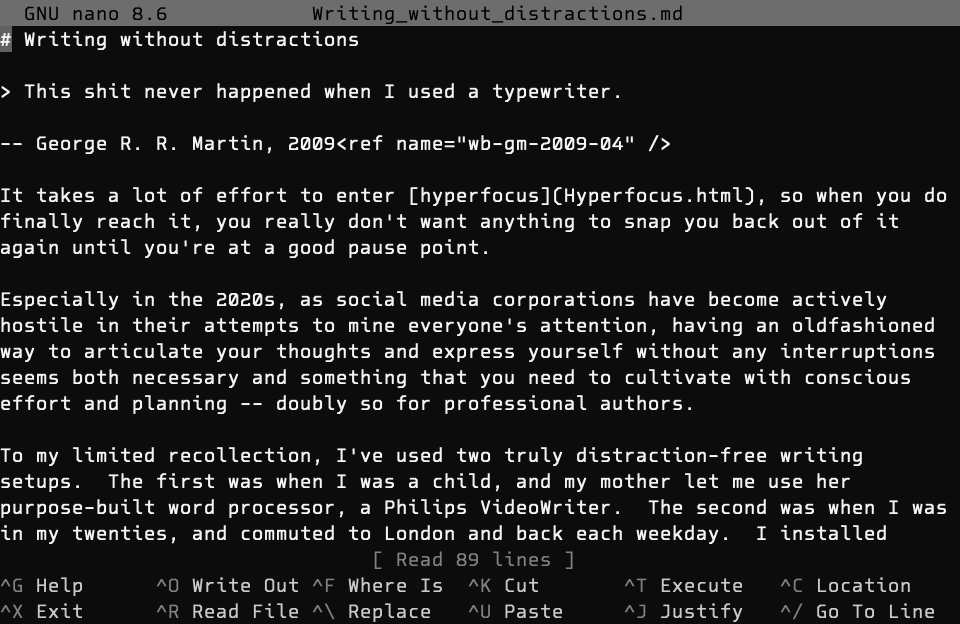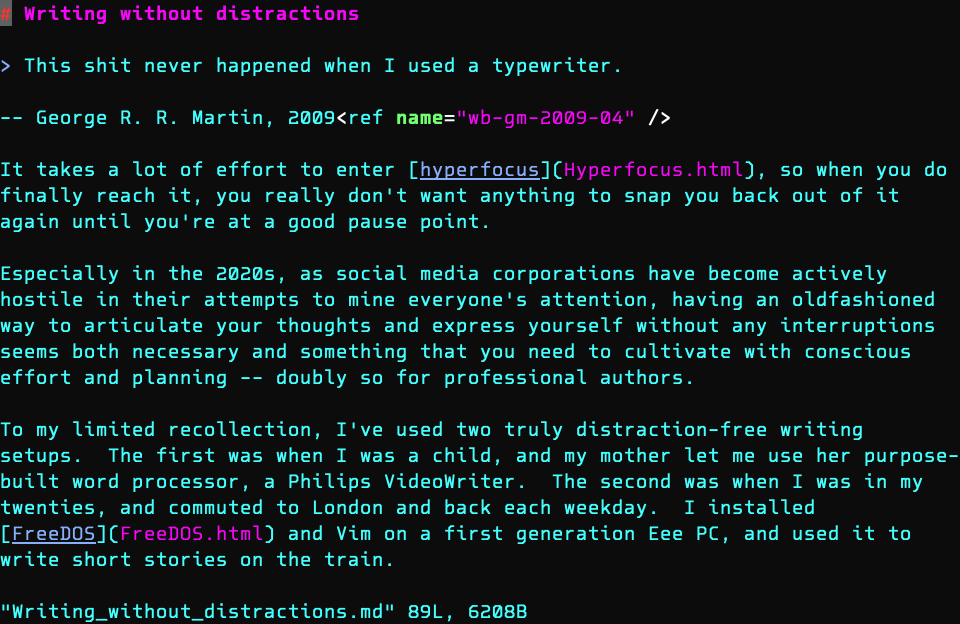Writing without distractions
𐑮𐑲𐑑𐑦𐑙 𐑢𐑦𐑞𐑬𐑑 𐑛𐑦𐑕𐑑𐑮𐑨𐑒𐑖𐑩𐑯𐑟

Hugo Gernsback's Isolator
This shit never happened when I used a typewriter.
— George R. R. Martin, 2009[1]
It takes a lot of effort to enter hyperfocus, so when you do finally reach it, you really don't want anything to snap you back out of it again until you're at a good pause point.
Especially in the 2020s, as social media corporations have become actively hostile in their attempts to mine everyone's attention, having an oldfashioned way to articulate your thoughts and express yourself without any interruptions seems both necessary and something that you need to cultivate with conscious effort and planning — doubly so for professional authors.
To my limited recollection, I've used two truly distraction-free writing setups. The first was when I was a child, and my mother let me use her purpose-built word processor, a Philips VideoWriter. The second was when I was in my twenties, and commuted to London and back each weekday. I installed FreeDOS and Vim on a first generation Eee PC, and used it to write short stories on the train.
There's also analogue writing methods, namely notebooks and typewriters, but although they're fine for writing, they're less useful for the subsequent editing.
That leaves me with a very specific writing tool, digital enough to allow constant tinkering, yet old enough to not distract you with on-the-fly spellchecking, autocompletion, typeface selection, and so on, let alone Internet access.
So I write using text editors, which are much closer to the original word processors. They may be intended primarily for programming in particular, but they work just as well for prose, be it fiction or non-fiction. As they use plain text files, they also avoid locking you into a proprietary format.
Pico comes pretty close to my needs, but it either fully embraces word wrap (adding the automated linebreaks to the file too, known as hard-wrapping), or ignores it entirely (making you scroll horizontally as well as vertically, with no wrapping at all). I want to display it, but not write it to the file (soft-wrapping).

GNU Nano
Thankfully, Pico's slightly more modern rival Nano implements soft-wrapping, with the appropriate settings in ~/.nanorc:
set softwrap set atblanks
It's the kind of thing I would recommend to people who just want to get writing done, if only they were comfortable at the command line.

Vim
Personally, I'm quite happy with Vim, which is pretty ubiquitous these days on most Unix clones, including Mac OS X. As a touch typist, vi in general is the only editor that doesn't frustrate me by being slow to navigate.
Over in the GUI, Sublime Text also works well for me.
For screenwriting, I usually use the more specialised WYSIWYG editor Slugline, which uses the Fountain format. As Fountain is simply a specific kind of plain text file, you can switch back and forth between Slugline and regular text editors as needed.
Quotes
My work machine does not even use Windows (which I loathe). I write with WordStar 4.0 on a pure DOS-based machine. Mock if you must... but WordStar and DOS are both stable as rocks, and never give me the sort of headaches I get from Windows. (I won't even talk about Microsoft Word, about which I have nothing printable to say.)
— George R. R. Martin, 2007[2]
Windows sucks. I use it, under protest, for the Internet, but all my fiction is written on a DOS machine, using WordStar 4.0. I'm a word guy. When I want to copy something, I like to type "copy". When I want to delete it, I like to type "delete". I don't like puzzling out these stupid little cartoons they call icons, or dragging them around with a mouse. The day WordStar 4.0 stops working is the day I retire.
— George R. R. Martin, 2007[3]
I have a secret weapon. I actually have two computers. I have the computer that I browse the Internet with and then I get my e-mail on, and I do my taxes on; and then I have my writing computer, which is a DOS machine, not connected to the Internet. Remember DOS? I use WordStar 4.0 as my word processing system.
I actually like it. It does everything I want a word processing program to do, and it doesn't do anything else. I don't want any help. I hate some of these modern systems where you type a lower case letter and it becomes a capital. I don't want a capital. If I'd wanted a capital, I'd have typed a capital. I know how to work the shift key. Stop fixing it.
— George R. R. Martin, 2014[4]
I write longhand, on a pad, because I believe that there is a connection between the brain and the hand. So it's very important to me, that. And then, when I've written something, I will put it into a Word document. And recently, the Word document is constantly saying "Would you like me to rewrite that for you?" And so I end up just going "I don't need you to fucking rewrite what I've just written! Will you fuck off? Just fuck off!" I'm so annoyed.
— Emma Thompson, 2025[5]
References
- "I Hate Computers" George R. R. Martin, Not a Blog, Apr 2009
- "Gleep" George R. R. Martin, Not a Blog, Jan 2007
- "Eight Things About Me" George R. R. Martin, Not a Blog, May 2007
- "George R. R. Martin Still Uses a DOS Word Processor" Conan, May 2014
- "Emma Thompson on Getting Paid to Be Funny, and Feeling 'Intense Irritation' Over A.I." The Late Show With Stephen Colbert, Oct 2025
Retrograde: A case for MP3 players | Writing without distractions
Ruminations: A case for MP3 players | Quantity Over Quality | Writing without distractions
Single-purpose devices: A case for MP3 players | Writing without distractions | iPod Mini
Text editors: Writing without distractions
